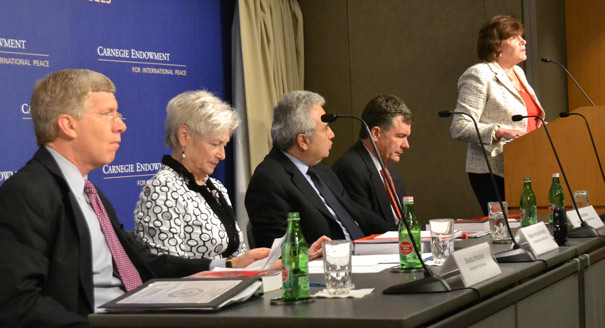Registration
You will receive an email confirming your registration.
The foundations of the global energy system are shifting, with a resurgence in oil and gas production in some countries, a possible retreat from nuclear power in others, and signs of an increasing policy focus on energy efficiency worldwide. Carnegie’s David Burwell moderated a discussion marking the release of the World Energy Outlook 2012. Deputy Secretary of Energy Daniel B. Poneman, International Energy Agency (IEA) Executive Director Maria van der Hoeven, and IEA Chief Economist Fatih Birol offered comments. Jessica Tuchman Mathews, president of the Carnegie Endowment, gave opening remarks.
Smart Decisions for Smart Technology in the United States
Dep. Sec. Poneman addressed the evolving picture of U.S. energy production and use. The last decade has seen a large investment in smart technologies to harvest the immense natural gas and unconventional oils potential found in the United States, he explained. Such investments have led to a substantial increase in domestic energy production, resulting in the United States predicted to becoming the number one oil producer in the world by2035 ¬¬¬. But in this moment of great progress, he argued that smart decisions must accompany these smart technologies to ensure future energy security, jobs, and prosperity. Demand side management, efficiency standards, and investment in renewable energies, carbon capture and storage, and nuclear power are all integral aspects of reducing the climate change impacts of using fossil fuels, Poneman said.
The Game Changer of Global Energy
Van der Hoeven outlined the key elements changing the global energy landscape and affecting the future stability, sustainability, and affordability of energy.
- The American Unconventional Oil and Gas Revolution: The unlocking of North America’s energy potential has been felt globally, she said. Middle Eastern oil exports have shifted to Asia as American demand is increasingly being met by domestic sources. She warned that it is important to proceed with caution as unconventional fuels remain in a formative stage.
- Iraq as a Forthcoming Energy Powerhouse: After decades of conflict and instability, Iraq is poised to make a significant contribution to global oil supply growth, van der Hoeven said. It will soon become a key supplier for fast-growing Asian markets, particularly China, and will become the second-largest global exporter by the 2030s.
- Energy Efficiency Essential in Reaching Untapped Potential: In an era of aging power infrastructure in developed countries and a rising need for investment in developing countries, energy efficiency can play a key role in meeting rising demands.. In addition to the need to tap new sources of supply,, energy efficiency measures can help fill the demand gap (by shrinking it), are cost-effective, reduce greenhouse gas emissions, and support other domestic policy initiatives.
The Future of Energy, the Global Market, and Climate Change
Birol discussed the changing foundations of the global energy system and its vast and varied effects on the economy, environment, and humanity.
- A Mix of Oil, Gas, Nuclear, and Renewables: The Fukushima Daiichi nuclear disaster has influenced countries around the world, among them France, Germany, and Switzerland, to drastically reduce their share of nuclear power production (although Chinese nuclear production continues to grow), Birol said. Meanwhile, the U.S. shale revolution increases the share of natural gas use worldwide, but especially in North America. Oil continues to play a vital role in energy security, with unconventional oils increasingly important. However, for the first time in many years, 2012 will see a decline in the rate that new renewable energy production comes on-line.
- Emerging Centers of Energy Production and Export: As natural gas markets become more globalized countries with high shares of shale gas, such as the United States, Canada, and Australia, will prosper while others, such as the EU and Russia, will decline in international industrial competitiveness and export volume, Birol said. As China, India, and other Asian countries grow, and as North America sources more of its energy supplies domestically, energy export flows will shift east, with Iraq meeting a large portion of that rising demand.. With such a dramatic rise in energy demand in China, the implications of technological and policy decisions made in Beijing will substantially affect global energy markets.
- The Unsustainability of the World Energy System: Even as leaders meet in Doha, the momentum for climate change action is slowing down, Birol warned. Carbon emissions are at an all-time high, while fossil fuel subsidies were up 30 percent to $523 billion in 2011. Maintaining the status quo could lead to a devastating increase in global temperature of six degrees Celsius, compared to a safer two degree scenario. If no action is taken, the planet will be locked into at least a two degree scenario by 2017. Although efficiency measures such as CAFÉ standards in the United States and CCS investment in China are promising, more action is necessary.
- Global Inequity in Access to Electricity: Today 1.3 billion people do not have access to electricity and instead use traditional biomass for fuel, which causes respiratory diseases, especially among women and children in the home, Birol added. By 2035, there will still be one billion people without access to electricity, mainly in sub-Saharan Africa.
